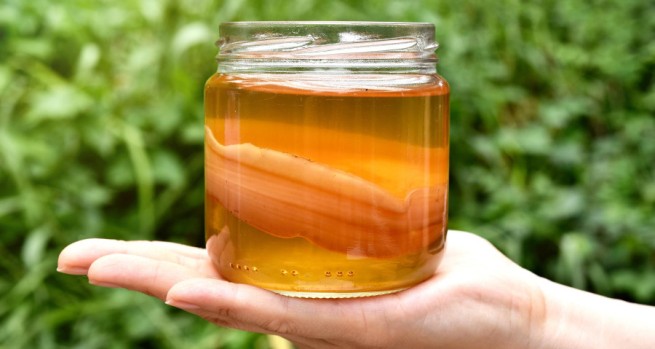Kombucha (kombucha) is a fermented drink made from sweetened tea and a special culture of bacteria.
It is believed that the drink originated in China two thousand years ago. Today, to prepare it, zooglea, a slimy mass of living bacteria and yeast, is added to sweetened tea (green or black) and left to “ferment” for several days or weeks. During this time, it turns into a slightly sweet, tart drink. Then the mucus is separated from it and bottled.
Kombucha is high in B vitamins, antioxidants and probiotics. The nutritional content of the drink varies depending on the preparation method, so it is important to read the label when purchasing. For example, store-bought kombucha contains about 30 calories and 2–8 grams of sugar per serving (glass). A 100 ml serving typically provides:
- 16 calories
- 0 g protein
- 3.0 g carbohydrates
- 3 g sugar.
How to make kombucha
To do this you need:
- sugar
- cold filtered water
- black or green tea (bags or loose leaf)
- zooglea bacteria (usually purchased from an existing batch of kombucha).

To prepare kombucha:
- tea and sugar are stirred in boiling water and allowed to cool before adding zooglea
- cover the container/jar with gauze and leave to ferment for up to a week
- pour the solution into an airtight container/bottle with a little sugar and leave for a few more days (the longer it sits, the more it foams). At this point, you can add flavorings such as spices or fruits.
Five Key Health Benefits of Kombucha:
1. Source of probiotics
Fermented foods such as yoghurt, sauerkraut and kefir contain live microorganisms. Because kombucha is a fermented food, it produces many beneficial probiotics. In certain concentrations, they can help balance bacteria levels in the gut and improve digestion.
However, today There is not enough research to confirm whether kombucha contains enough of these beneficial bacteria to be considered an effective probiotic product. Additionally, the amounts and strains of probiotic microbes vary depending on how the kombucha is prepared and how long it is fermented.
2. Likely to be a source of antioxidants
Antioxidants protect the body from oxidative damage caused by free radicals. Free radicals are a normal by-product of processes in the body, but the main thing is minimize their impact, consuming foods and drinks rich in antioxidants.
Tea (especially green tea) is rich in a group of antioxidants called polyphenols (especially catechins). However, there are a number of factors that can affect the antioxidant properties of kombucha, including the tea it is made from and the fermentation time.
3. May contain vitamins and minerals
Kombucha contains small amounts of vitamins and minerals produced by the breakdown of sugars by yeast, including vitamin C and B vitamins such as thiamine (B1), pyridoxine (B6) and cobalamin (B12). Levels of these vitamins likely vary between commercial kombucha products.
4. May Have Antifungal Properties
One of the by-products of fermentation is acetic acid and it is believed that it, as well as other compounds found in green and black tea, can inhibit the growth of less desirable bacteria and yeasts while promoting the development of more beneficial strains.
5. Supports Heart Health
Animal studies suggest that drinking kombucha may improve cholesterol control and, when combined with protective polyphenols in tea (especially green tea), reduce the risk of heart disease.
Is kombucha safe for everyone?
Kombucha is classified as functional food due to potentially beneficial effects when used as part of a varied and balanced diet. However, he may not be suitable for everyone and have some health risks.
Tea mushroom not recommended for pregnant and breastfeeding women, as well as people with weakened immune systems. It is important to emphasize once again that there have not been many clinical studies on humans confirming the safety and effectiveness of kombucha. There have been reports that drinking too much of the drink can lead to unpleasant side effects such as stomach pain, nausea and dizziness. Long-term Fermentation is not recommended due to the accumulation of organic acids, which can reach harmful levels.
Fermented foods such as kombucha are rich in histamine. Therefore, people with histamine intolerance should be careful as drinking kombucha may worsen their symptoms.







More Stories
Vaccine to combat antibiotic resistance
Oral health: increased risk of cancer
Avian influenza virus found in cow's milk